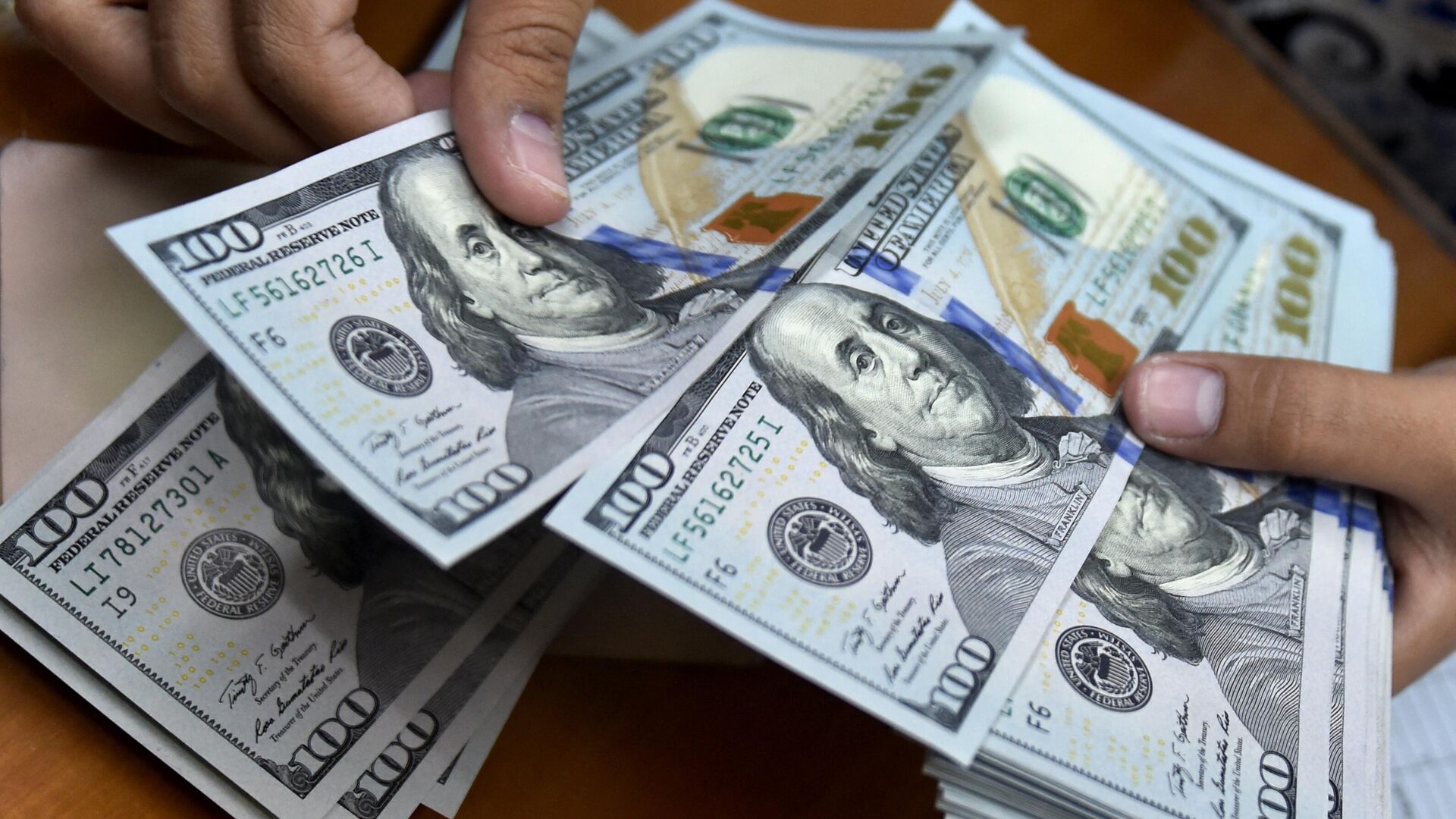https://en.sputniknews.africa/20231005/us-dollar-dominance-ensures-free-flow-of-wealth-from-global-south-to-west-expert-says-1062563750.html
Global South' Wealth Flows West Due to USD Dominance: Expert
Global South' Wealth Flows West Due to USD Dominance: Expert
Sputnik Africa
On Thursday, the Russian city of Sochi is hosting the last day of the country's think tank, Valdai International Discussion Club's meeting. This year's... 05.10.2023, Sputnik Africa
2023-10-05T17:50+0200
2023-10-05T17:50+0200
2023-10-10T13:06+0200
international
west
us dollar
opinion
united states (us)
sputnik africa
russia
africa insight
valdai discussion club
https://cdn1.img.sputniknews.africa/img/07e7/09/0a/1062014900_0:130:3179:1918_1920x0_80_0_0_d051bc9994678638194a9480267f667b.jpg
The US dollar dominance is one of the tools, which are used to ensure the free flow of the wealth from countries of the Global South to the West, Irina Abramova, Director of the Institute of Africa of the Russian Academy of Sciences (RAS), Member of the Presidium of the RAS, told Sputnik Africa on the sidelines of Valdai International Club meeting.The expert added that "the system of colonialism has not gone anywhere, has not collapsed."The head of the institute also noted that in order to change the situation, it is necessary to modify the instruments, especially the financial ones, with which the West maintains its dominance.In addition, the researcher highlighted that as a US dollar issuer, the US "shifts its [financial] problems" to other countries.Speaking about the ways to move away from the US dollar, the expert underscored that the Chinese currency, yuan, which is seen by many as a possible replacement for the US dollar, is unlikely to become an alternative as it is "not interesting for most countries, including the African states."Commenting on the use of national currencies in trade, the researcher is convinced that it is a "transitional stage" in the process of de-dollarization, adding that unequal trade balance between the trading parties hinders the utilization of local currencies in trade.Elaborating on the issue, Abramova said that "exports to Africa are about five times higher than imports from [the continent]," noting that if Russia is to switch to settlements in the national currency with an African country, it would be Egypt due to "the remaining large tourist flow and volume of trade." However, according to the researcher, even in this case, the trade imbalance "is still enormous," which means that the use of local currencies in trade with other African states is "impossible at this stage."Moreover, the expert emphasized that "the future really does lie in digital currencies," underlying that the continent is quite advanced in this regard.Furthermore, the expert underscored the need to change these tools of the Western dominance in order to liquidate sanctions as they are imposed with the help of these instruments. In conclusion, Abramova noted that she is "quite optimistic about the future," as Russia's special military operation "has dramatically accelerated" all the processes connected to the transformation of the global order.From Monday to Thursday, the 20th annual gathering of the Valdai Discussion Club is taking place. The event brought together economic and political experts from over 42 countries around the world.
https://en.sputniknews.africa/20231005/african-nations-use-of-us-dollars-limits-their-ability-to-address-internal-challenges-expert-says-1062556582.html
west
united states (us)
russia
Sputnik Africa
feedback@sputniknews.com
+74956456601
MIA „Rossiya Segodnya“
2023
Rasina Musallimova
https://cdn1.img.sputniknews.africa/img/07e7/0a/17/1063019139_0:0:646:646_100x100_80_0_0_348c74b69cf86748a53875f8148a2f85.jpg
Rasina Musallimova
https://cdn1.img.sputniknews.africa/img/07e7/0a/17/1063019139_0:0:646:646_100x100_80_0_0_348c74b69cf86748a53875f8148a2f85.jpg
News
en_EN
Sputnik Africa
feedback@sputniknews.com
+74956456601
MIA „Rossiya Segodnya“
Sputnik Africa
feedback@sputniknews.com
+74956456601
MIA „Rossiya Segodnya“
Rasina Musallimova
https://cdn1.img.sputniknews.africa/img/07e7/0a/17/1063019139_0:0:646:646_100x100_80_0_0_348c74b69cf86748a53875f8148a2f85.jpg
international, west, us dollar, united states (us), sputnik africa, russia, africa insight, valdai discussion club
international, west, us dollar, united states (us), sputnik africa, russia, africa insight, valdai discussion club
Global South' Wealth Flows West Due to USD Dominance: Expert
17:50 05.10.2023 (Updated: 13:06 10.10.2023) Longread
On Thursday, the Russian city of Sochi is hosting the last day of the country's think tank, Valdai International Discussion Club's meeting. This year's meeting, the 20th one, is held under the theme "Fair Multipolarity: How to Ensure Security and Development For All."
The US dollar dominance is one of the tools, which are used to ensure the free flow of the wealth from countries of the Global South to the West, Irina Abramova, Director of the Institute of Africa of the Russian Academy of Sciences (RAS), Member of the Presidium of the RAS, told Sputnik Africa on the sidelines of Valdai International Club meeting.
"The tools of colonialism have changed. [...] Now they are more sophisticated, in particular, the dominance of the dollar, the destruction of national identity, the restriction of the space to use one's own language, bribing elites, all sorts of sanctions, and so on, and so forth. The goal remains the same - the struggle for resources, the struggle for wealth in order to ensure the free flow of wealth from the regions of the global south, which has been developing much faster than the West over the past 20 years, respectively, to the West," Abramova said.
The expert added that "the system of colonialism has not gone anywhere, has not collapsed."
The head of the institute also noted that in order to change the situation, it is necessary to
modify the instruments, especially the financial ones, with which the West maintains its dominance.
"In order to change this, firstly, we need to change the tools, as the global economical basis has already moved from the West to the South and East. As for the tools, it is quite difficult to change them, because the global West, if you can call it that, continues to use them successfully. The main tool, of course, is the dominance of the dollar, because, no matter what we say, most of the world's transactions continue to be carried out in this currency," she stressed.
In addition, the researcher highlighted that as a US dollar issuer, the US "shifts its [financial] problems" to other countries.
"And, accordingly, America has an emission function, and since 1947, with the introduction of the Bretton Woods system, in fact, is the owner of a reserve currency, therefore it shifts its problems, including economic debts to the whole world," Abramova underlined.
Speaking about the ways to move away from
the US dollar, the expert underscored that the Chinese currency, yuan, which is seen by many as a possible replacement for the US dollar, is unlikely to become an alternative as it is "not interesting for most countries, including the African states."
Commenting on the use of national currencies in trade, the researcher is convinced that it is a "transitional stage" in the process of
de-dollarization, adding that unequal trade balance between the trading parties hinders the utilization of local currencies in trade.
"Will it be, for example, settlements in national currencies? Yes, as a transitional stage, this is probably possible, but for this it is necessary to balance the trade balance between the participants in the trade process," the head of the institute highlighted.
Elaborating on the issue, Abramova said that "exports to Africa are about five times higher than imports from [the continent]," noting that if Russia is to switch to settlements in the national currency with an African country, it would be Egypt due to "the remaining large tourist flow and volume of trade." However, according to the researcher, even in this case, the trade imbalance "is still enormous," which means that the use of local currencies in trade with other African states is "impossible at this stage."
Moreover, the expert emphasized that "the future really does lie in digital currencies," underlying that the continent is quite advanced in this regard.
"I think the future really does lie in digital currencies. And, by the way, Africa in this regard, well, it cannot be said that it leads the world, but the continent is a fairly developed region in cryptocurrencies. Several African countries are among the top ten world leaders in online payments. Africa is also leading, at least in terms of growth rates. I keep giving an example that the first online payment in the world was not made in the US, not in Europe, but in a such African country as Kenya. And if you come to an African country, you will be able to pay for the goods using your mobile phone, which is not always possible in the West," she revealed.
Furthermore, the expert underscored the need to change these
tools of the Western dominance in order to liquidate sanctions as they are imposed with the help of these instruments.
"So we have to think about how to change the tools, how to change the mechanisms. Because if we do not get rid of this institutional domination of the West, we will not be able to get rid of sanctions, among other things. Because sanctions are largely implemented because these tools are in the hands of the West and primarily financial flows," the researcher said.
In conclusion, Abramova noted that she is "quite optimistic about the future," as Russia's special military operation "has dramatically accelerated" all the processes connected to the transformation of the global order.
From Monday to Thursday, the 20th annual gathering of the Valdai Discussion Club is taking place. The event brought together economic and political experts from over 42 countries around the world.



